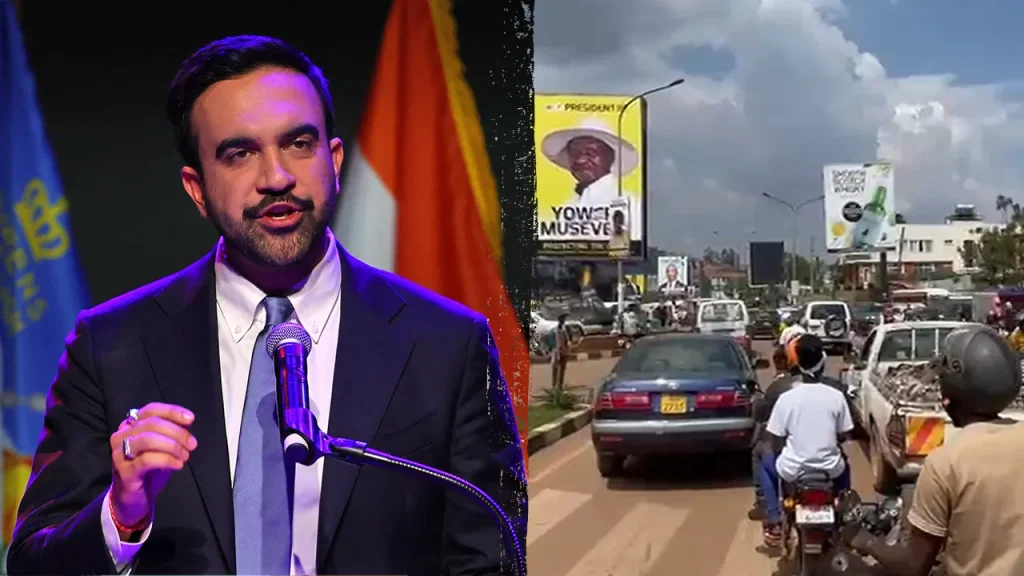A Global Voice Rises: Zohran Mamdani’s Mayoral Victory Reverberates Worldwide
Zohran Mamdani’s groundbreaking election as New York City’s first Muslim mayor has sent ripples across the globe, transforming a local political victory into an international conversation about representation, progressive politics, and the changing face of American leadership. The 34-year-old Democratic Socialist, born in Uganda to Indian parents before immigrating to America, has become more than just New York’s newest mayor – he’s emerged as a powerful symbol that resonates differently across continents and cultures. His victory, built on promises of rent freezes, free public transit, and affordable living, speaks to universal struggles while highlighting deep political divides about what his leadership might mean for New York and beyond.
In Uganda, where Mamdani spent his earliest days before his family’s departure, his victory has been embraced with particular pride. “He has made history for Uganda,” declared Siraje Kifamba Nsamba, a social worker at Uganda’s Islamic Center for Education and Research. Despite leaving as an infant, many Ugandans claim him as their own, seeing in his rise an affirmation of what’s possible for immigrants and Ugandans alike on the global stage. The sentiment was captured by a Kampala resident who emotionally noted, “I want to cry out loud because we lost such a great leader to New York,” while a local rapper and politician called his victory “a triumph for artists, dreamers, and immigrants.” This embrace speaks to the power of representation and the way Mamdani’s success transcends borders, becoming a source of inspiration for young people who see themselves reflected in his journey from East African roots to leading America’s largest city.
The Middle East’s response to Mamdani’s election revealed the polarizing nature of his political positions, particularly regarding the Israel-Hamas conflict. Several Hamas-affiliated channels celebrated the victory, with one describing him as “a supporter of Hamas and a hater of Israel” – characterizations that Mamdani himself would likely reject but that reflect how his critical stance toward Israeli policies has been received. In Israel, the reaction was swift and severe, with government ministers issuing stark warnings. Amichai Chikli, Israel’s Minister of Diaspora Affairs, claimed New York had “handed over its keys to a supporter of Hamas,” while National Security Minister Itamar Ben-Gvir declared the election would “be remembered forever as a moment when antisemitism triumphed over common sense.” These reactions underscore how Mamdani’s victory has become entangled in one of the world’s most contentious geopolitical conflicts, with his progressive stance on Palestinian rights becoming both a rallying point for supporters and a source of grave concern for critics.
European leftists embraced Mamdani’s win as a beacon of hope in what many see as darkening political times. London’s Mayor Sadiq Khan, himself a groundbreaking Muslim leader of a major Western city, congratulated Mamdani by stating, “New Yorkers faced a clear choice – between hope and fear – and just like we’ve seen in London – hope won.” The sentiment was echoed by former UK Labour Party leader Jeremy Corbyn, who volunteered for Mamdani’s campaign and called it “a seismic victory — not only for the people of New York, but for all those who believe that humanity and hope can prevail.” French MEP Manon Aubry framed the victory as “a huge breath of hope in the world of Trump,” praising Mamdani for overcoming “the media, economic, and political establishment” and for refusing to “turn a blind eye to racism and Gaza.” For many European progressives, Mamdani represents the possibility that left-wing politics can still win major victories even as conservative forces gain ground across their continent.
Mamdani’s path to City Hall wasn’t just remarkable for breaking religious barriers – it also represented a decisive victory for the progressive wing of the Democratic Party at a time when many had written off the viability of democratic socialism as a winning political strategy in major American elections. His platform embraced classic democratic socialist policies: rent freezes in a city facing an acute housing crisis, free public transit in one of the world’s most expensive urban centers, and broader commitments to economic justice that resonated with working-class New Yorkers struggling with the city’s high cost of living. This aspect of his victory has heartened progressives worldwide, with Canada’s leftist NDP leader Jagmeet Singh noting, “At a time when the odds feel so stacked against working-class people, the people of New York made history.” For many on the left, Mamdani’s win suggests that boldly progressive platforms can succeed even against well-funded opposition and establishment skepticism.
As Mamdani steps into his historic role, he carries with him not just the hopes of New Yorkers who elected him, but also the weight of global expectations and scrutiny. His victory represents the complex intersection of identity politics, progressive economics, and foreign policy that defines much of today’s left. For supporters, he embodies the possibilities of a more inclusive, economically just society; for critics, his positions on international issues like the Israel-Palestine conflict raise concerns about how he’ll govern America’s most prominent city. What’s clear is that Mamdani’s election has transcended ordinary local politics to become a global conversation about representation, power, and the direction of progressive politics in the 21st century. As he begins the challenging work of governing, the world will be watching to see how this child of immigrants, raised between cultures and committed to transformative politics, shapes New York’s future and, perhaps, influences progressive movements far beyond America’s shores.


